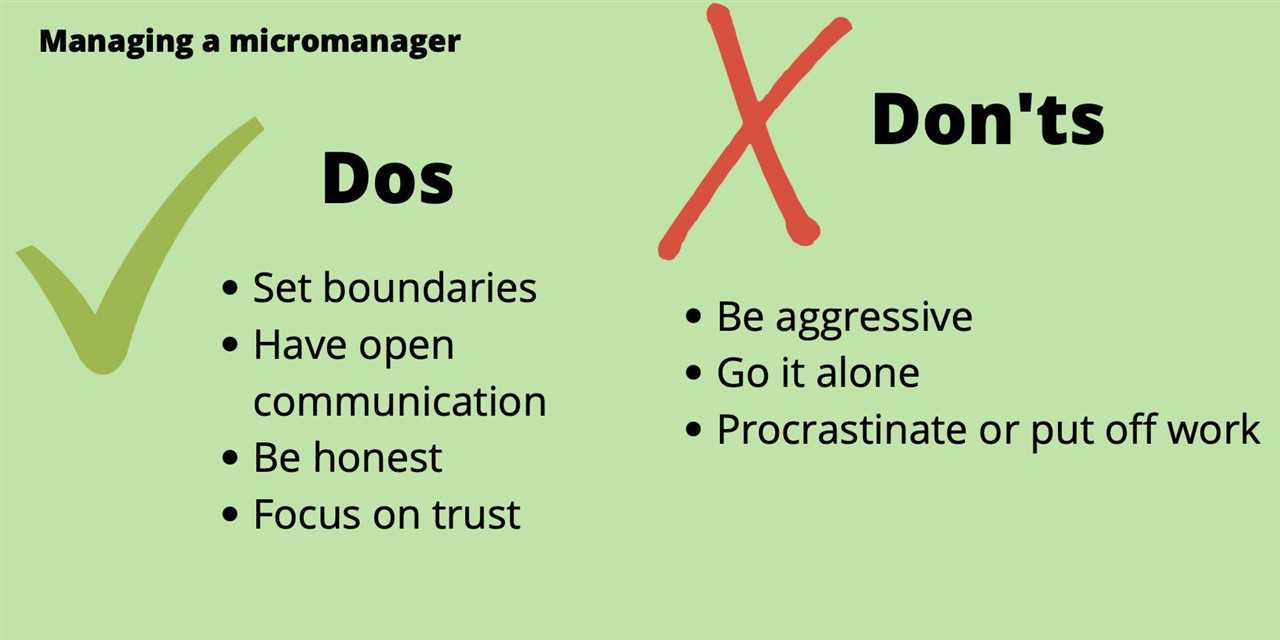Recognizing the Signs

Micromanagement can have a detrimental effect on both employees and the overall productivity of a business. It is important for business leaders to recognize the signs of micromanagement in order to address the issue and create a healthier work environment.
One of the key signs of micromanagement is excessive control and monitoring of employees’ work. Micromanagers tend to closely monitor every aspect of their employees’ work, often checking in frequently and demanding constant updates. This level of control can lead to a lack of autonomy for employees, causing them to feel stifled and demotivated.
Another sign of micromanagement is a lack of trust in employees’ abilities. Micromanagers often feel the need to double-check and redo tasks that have already been completed by employees. This lack of trust can be demoralizing for employees, as it sends the message that their work is not valued or trusted.
Additionally, micromanagers tend to be overly critical and nitpick every detail of their employees’ work. They may focus on minor mistakes or insignificant details, rather than recognizing the overall quality of the work. This constant criticism can lead to a negative work environment and decreased employee morale.
Furthermore, micromanagers often have difficulty delegating tasks and responsibilities. They may feel the need to be involved in every decision and task, which can lead to a bottleneck in the workflow and prevent employees from taking on new challenges and growing in their roles.
It is important for business leaders to be aware of these signs of micromanagement and take steps to address the issue. This can include providing training and support for micromanagers to develop more effective leadership skills, promoting a culture of trust and autonomy, and encouraging open communication between managers and employees. By recognizing and addressing the signs of micromanagement, businesses can create a more positive and productive work environment.
Strategies for Improvement
Dealing with micromanagement can be challenging, but there are strategies that can help improve the situation and create a more productive work environment. Here are some strategies to consider:
1. Open Communication
One of the most important strategies for dealing with micromanagement is to foster open communication with your manager. Schedule regular check-ins or one-on-one meetings to discuss your progress, concerns, and any challenges you may be facing. By keeping your manager informed and involved, you can help alleviate their need to micromanage.
2. Set Clear Expectations
3. Demonstrate Competence
One way to combat micromanagement is to demonstrate your competence and expertise in your role. Take the initiative to learn new skills, stay up-to-date with industry trends, and consistently deliver high-quality work. By showing your manager that you are capable and trustworthy, they may feel more comfortable giving you autonomy and space to work.
4. Build Trust
Building trust with your manager is crucial in reducing micromanagement. Be reliable, meet deadlines, and follow through on your commitments. Communicate openly and honestly, and be transparent about your progress and any challenges you may be facing. By consistently demonstrating your trustworthiness, your manager may feel more confident in giving you the freedom to work independently.
5. Seek Feedback
Regularly seek feedback from your manager to understand their expectations and how you can improve. Actively listen to their feedback and implement any suggestions or changes they recommend. By showing that you are receptive to feedback and willing to make adjustments, you can help build a stronger working relationship and reduce micromanagement.
6. Take Initiative
Take initiative in your work by identifying opportunities for improvement, suggesting new ideas, and taking on additional responsibilities when appropriate. By demonstrating your proactive approach and ability to work independently, you can show your manager that you are capable of handling tasks without constant supervision.
Remember, dealing with micromanagement requires patience and persistence. By implementing these strategies and maintaining open communication with your manager, you can work towards creating a more trusting and productive work environment.

Emily Bibb simplifies finance through bestselling books and articles, bridging complex concepts for everyday understanding. Engaging audiences via social media, she shares insights for financial success. Active in seminars and philanthropy, Bibb aims to create a more financially informed society, driven by her passion for empowering others.
